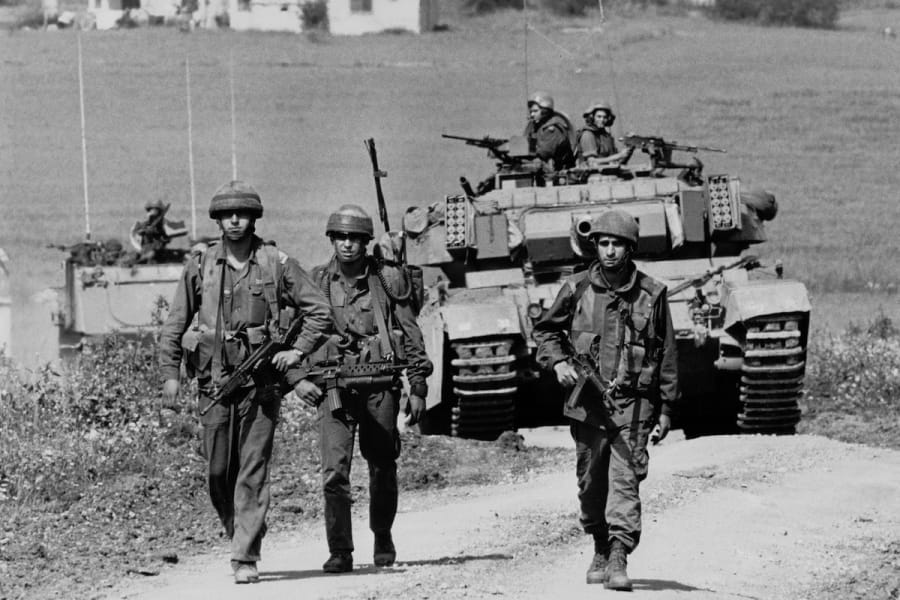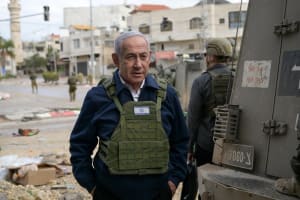June 6, 1982: A day of remembrance in Israel: Was 'Operation Peace for Galilee' a warranted response?
Part One in a series on the First Lebanon War

This past week, much of the world looked to the beaches of Normandy to commemorate the 80th anniversary of the Allied landings on June 6, 1944. Operation Overlord is most often remembered as D-Day.
Veterans, family members, national leaders, and current military members have made great efforts to pay tribute to and honor the Allied soldiers who risked and sacrificed so much in the quest to break the vicious Axis control over the European continent and pave the way to Allied victory in World War II.
However, fewer recognize another significant event that took place on that same day, 38 years later. In Israel, June 6th is remembered as the day Israel launched its longest military conflict. On that day in 1982, Israel commenced "Operation Peace for Galilee."
More commonly referred to as the First Lebanon War, the conflict was initiated out of necessity for Israel to fight back against Palestine Liberation Organization (PLO) terrorists who had operated out of southern Lebanon in the months leading up to Israel's military offensive.
In the spring of 1975, Lebanon had been quickly overwhelmed by the outbreak of a civil war. The fighting was initially spurred by conflict between Christians and Muslims. In a short time, the tumultuous conditions paved the way for expansive violence, terrorist acts, and an influx of warlords. At the initial signs of the war, most Westerners, influential Arab leaders, and those who could afford to, deserted Lebanon. Soon, any semblance of Western civilization or order was dismantled in places like Beirut, and replaced with barbarity and disorder. One group that benefited from the chaos was the PLO.
The Palestine Liberation Organization was created in 1964 during an Arab League Summit held in Cairo. The organization was established with the aim to organize the various split groups of Arabs who had lived in Mandated Palestine. Palestinian refugees living in camps in Lebanon and Jordan made up the original base of the PLO as a militant group. In 1971, the PLO was forced to consolidate and relocate its headquarters to Lebanon. At that time, the organization’s belligerent actions included launching unprovoked attacks on Israeli military targets as a means of fulfilling the PLO’s primary objective, the destruction of Israel.
Under orders from the new headquarters in Lebanon, the PLO redefined strategies and expanded its tactics. These changes throughout the late 1970s included a willingness to conduct terrorist acts, including bombings and hijacking aircraft, outside of the Middle East.
By 1981 the worsened conditions in Lebanon had not only enabled the growth of the PLO but also invited the influx of large numbers of Syrian forces. As a result, the Lebanese Christian group Phalangist appealed to Israel for aid and protection. Without intervention from the Israel Defense Forces, Christians in Lebanon were facing certain annihilation.
In late April 1981, then-Prime Minister Menachem Begin approved the Israel Air Force (IAF) to use force to support the Lebanese Christian militia. In two separate incidents, the IAF shot down MI-8 Syrian Air Force helicopters. As a result of this action, the Syrian army switched to using Surface-to-Air missiles in the Syrian-held east Lebanon, thereby preventing IAF reconnaissance flights over Lebanon. Both Syria and Israel considered each other’s actions to be a violation of a tacit agreement between the nations.
Under these conditions, the PLO chose to exploit opportunities to expand its unprovoked, indiscriminate attacks against 33 Israeli towns and villages in northern Galilee. The assaults quickly brought normal life and tourism in that part of Israel to a halt. The IDF response included bombing the PLO headquarters in Beirut and bases in Lebanon. This, in turn, prompted even further PLO violence launched from behind Lebanon's borders against Israeli civilians.
At the behest of Begin, then-U.S. President Ronald Reagan sent retired Ambassador Philip Habib as a mediator. With more than 30 years of diplomatic experience, Habib was believed to be the perfect figure to negotiate a peace agreement for the Lebanese Civil War. However, throughout the remainder of 1981 and into early 1982, the conflict continued as each ceasefire was quickly violated, which was followed by a resumption of violence. During this cycle of peace talks and violations, the PLO launched more than 240 terrorist acts against Israeli targets.
On June 3, 1982, Israeli Ambassador to Great Britain Shlomo Argov, following a diplomatic dinner at the Dorchester Hotel in Mayfair, London, was attacked by Arab terrorists. Argov was shot three times. Though the ambassador survived the assassination, he was critically wounded.
The attack served as the catalyst, prompting the Israeli Cabinet to approve the offensive invasion into Lebanon, "Operation Peace for Galilee."
In the next article in this series: The IDF push to shut down PLO camps in southern Lebanon, 25 miles from the border.

Though an educator for more than twenty years, following her return to school to earn a master’s degree in military history at Norwich University, Tara Simpson began working as a freelance writer for both the Stars and Stripes newspaper and ABC-CLIO reference publications. Inspired by her grandparents’ service in World War II and beyond, Tara has specialized in research and writing on early twentieth century military history for over a decade. She is now as a Doctoral student at Liberty University with her dissertation research focusing on Israel’s early and modern military history.
You might also like to read this:













